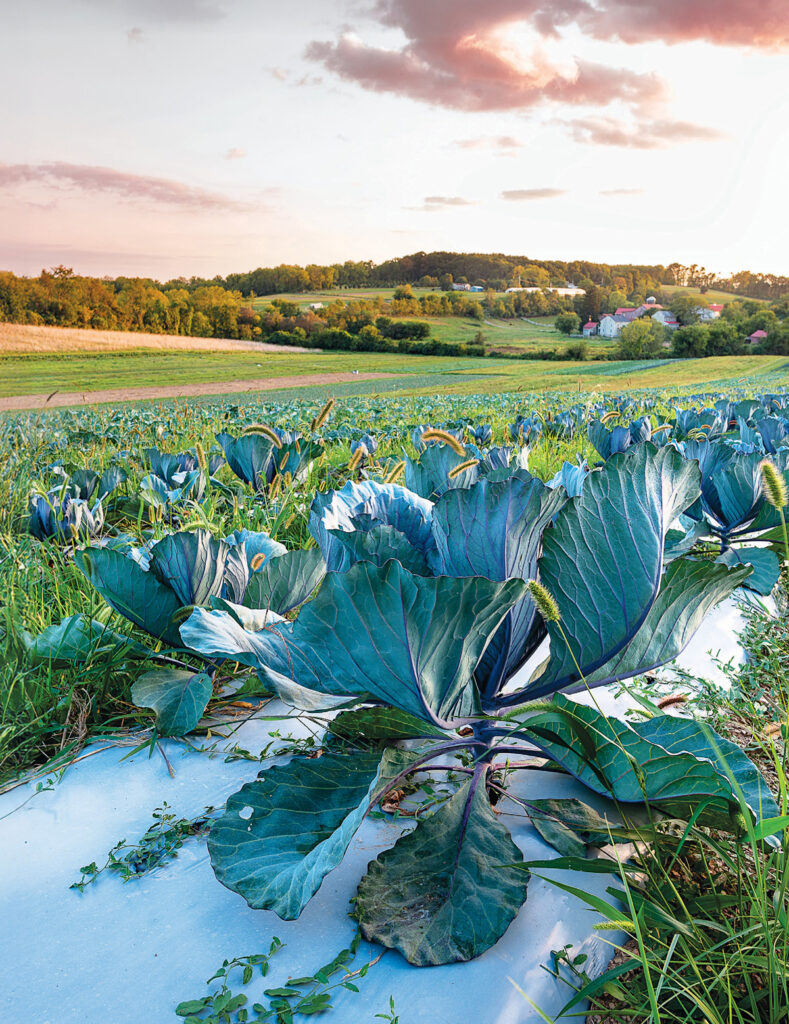BY PETER TODARO | PHOTOS BY ROBERTO QUEZADA-DARDÓN
STROLL THROUGH THE PRODUCE AISLE of many grocery stores and you’ll be greeted by a rainbow of fruits and vegetables cheerfully labeled “local,” “organic,” or often both. It’s a testament to how far the farm-to-table conversation has come. Yet, behind these inviting signs—as many of us are aware—the reality of American agriculture tells a more sobering story.
RESETTING THE TABLE
Despite the increasing popularity of locally grown and organic foods, the rise of farmers markets, and more restaurants using local ingredients, the number of farms in our country has been on a prolonged, steep decline. Nearly a century ago, the United States counted close to 7 million farms—most of them small, family-owned operations. Today, that number has been whittled down to about 1.9 million, even as the average farm size has ballooned to over 460 acres.
The organic movement—pioneered in the U.S. by organizations like Kutztown’s Rodale Institute—emerged from a desire to eliminate synthetic pesticides and herbicides while restoring the vibrancy of small-scale farming. Measuring by net sales alone, it seems like they’re successful. Locally grown produce sales have risen from about $5 billion in 2008 to nearly $9 billion today, according to USDA estimates. The Organic Trade Association estimates that $70 billion of USDA organic products were sold in 2023 alone.
But as local and organic foods have become more mainstream, and organic brands are bought by much larger brands, the small-farm ethos they were inextricably linked to tends to disappear. When large companies replace small farmers in delivering these products to consumers, the result is predictably more of the same: fewer farms but larger ones, the centralization of supply chains, and more land given over to development, including warehouses replacing what was once prime agricultural land.
Beyond land use debates and the livelihood of farming families, smaller farms supply vital ecosystem services and help keep money circulating locally—reinvesting profits with neighbors instead of returning it to far-flung shareholders.
If we can agree that small farms are worth our support, the obvious next question would be: What’s the most direct way to support them? Farmers markets are always an appealing option, but there are drawbacks for farmers (extra labor, time away from the farm). But if we can get this right, everything from the vibrancy of our communities to the health of soil and people, to the very aesthetics of our landscapes will change for the better.
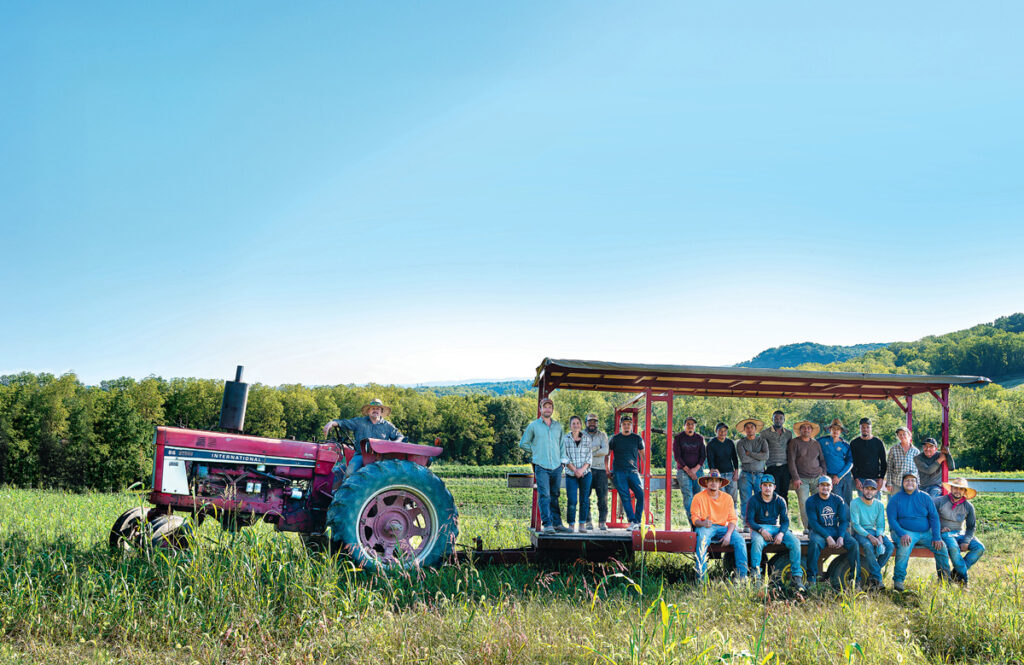
ENTER THE CSA, COMMUNITY-SUPPORTED AGRICULTURE
Farmers markets, wholesale arrangements, and other channels through which farmers sell their produce are all equally important, but perhaps not equally viable for all farms. CSA offers something truly special.
For the uninitiated, members purchase a CSA “share” from a farm at the start of the season—providing the farmer with up-front capital to purchase seeds, hire labor and invest in equipment. Then, as the harvest starts to roll in, members receive a weekly selection of produce and other goodies, experiencing the beautiful unfurling of the growing season.
The CSA, in many ways, is an exercise in participating in the harvest with your farmer, without doing the physical labor. This includes exposure to some risks associated with farming, like the weather. For example, in the event of adverse weather, the fruits and vegetables typically included in your share may change from week to week. Most often, though, the biggest problem you’ll experience will be figuring out how to prepare or preserve all of the fresh, delicious produce you receive during the height of the growing season.
With no middlemen or marketing campaigns, CSA membership creates a meaningful bond, with members and farmers sharing in the highs and lows of the season. Through my experience with CSAs as a member, I can attest to the weekly rhythm of interaction at pickups that immediately connects you with your farmer, where your food comes from, and your neighbors. It’s a meaningful experience that feels worlds away from the sterile aisles of a big box store. In a world defined by breathlessly rapid change, having a connection to a weekly harvest from a piece of land you truly get to know brings comfort, security, and a sense of place.
WHAT’S IN A CSA?
CSAs come in all shapes and sizes, with some offering add-ons like honey, pasta, local meat, and eggs while others simply stick to produce. To keep it affordable and attractive for potential members, many CSAs offer sliding scales or payment plans. In our corner of Pennsylvania, we’re lucky to have many CSA options to choose from, but these three bring something special.
GOOD FARM: Variety is the Secret Sauce
Germansville


John and Aimee Good’s land slopes gently toward the Blue Mountain ridge, a part of the Appalachian Mountains that juts almost vertically into the horizon in Germansville. Owners of the aptly named The Good Farm, John and Aimee, as well as their crew led by Assistant General Manager Dave Emrick, tend to 10 acres of fields that feed their 250-member CSA.
Born and raised in Emmaus, John and Aimee returned to western Lehigh County after stints working at farms in Massachusetts, including time spent at the famed Food Bank Farm. In 2006, they answered a newspaper advertisement to rent land at the Rodale Institute, launching Quiet Creek Farm and their first CSA. At Quiet Creek, they experimented by selling produce at farmers markets but eventually landed on the CSA model, which they grew to hundreds of members.
Since moving to their own land in Germansville in 2017, the Goods have sought to tinker with their CSA model to ensure it meets their members’ needs. “We’ve learned that variety is key,” Aimee explains. “When people have a bad experience with CSAs, it’s often because they get too many of the same thing in a row.” To solve this common problem, the Goods are keen on flexibility. Members can opt for small or large shares; whether or not to sign up for weekly addons like mushrooms, fruit and eggs; and to pick up their share on the farm or at one of nearly half a dozen pickup locations in the surrounding area.
For members who pick up on the farm, the Goods also offer market-style farm pickup, where families are free to customize their shares, pick vegetables and flowers from their U-pick garden, and purchase bulk “seconds” of crops like tomatoes to preserve for the winter. Through newsletters written by Aimee, members receive recipes and updates from the farm, helping them follow the flow of the growing season. Many members have seen a positive impact on their health after joining: “People learn they love fruits and vegetables,” says Aimee. “They feel better, lose weight, have more energy—it’s just a win-win for everyone involved.”
The long-term support the farm enjoys from its members takes on a new significance when one considers the rapid pace of development in the Lehigh Valley. “They may not realize it, but who you’re buying food from determines how land is used and, ultimately, what your community looks like,” says John.
“[Members] may not realize it, but who you’re buying food from determines how land is used and, ultimately, what your community looks like.”
—John Good
Hunter Hill: Small Footprint, Big Impact
Easton
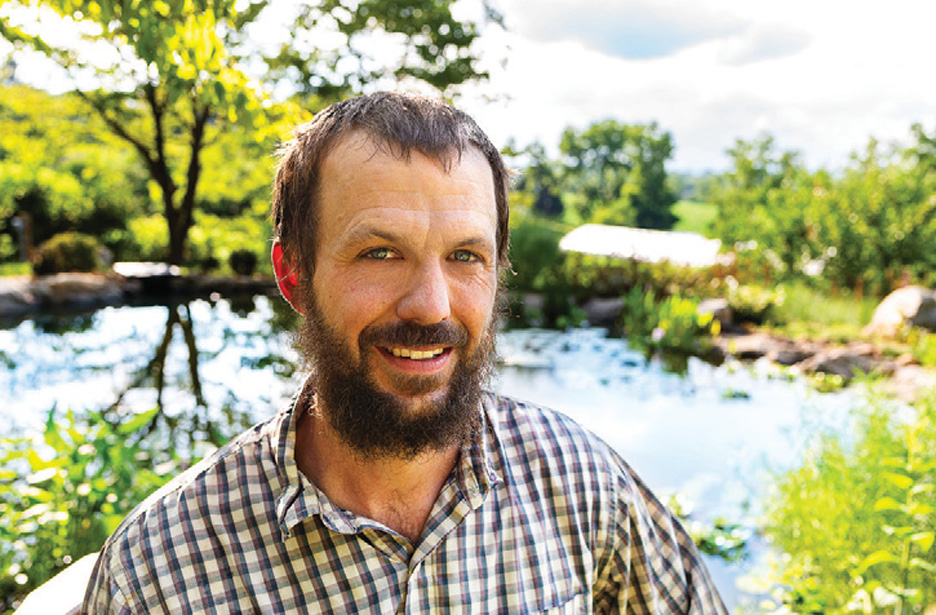
Ask Dan Hunter how he found his way into farming, and you might be surprised by his answer: “I got freaked out about peak oil,” he says with a laugh. After tuning in to weekly C-SPAN discussions about global oil production entering terminal decline, his immediate response was to do something tangible. “Farming felt like a direct action I could take.” It’s a twist of fate that set him on a path from local music gigs in Easton to founding Hunter Hill CSA, which serves a loyal set of members in a beautiful holler just off scenic Route 611.
Dan began farming in 2006, working for well-respected Jeff Frank and Kristin Illick of Liberty Gardens in Coopersburg. “Through them I learned about efficiency, growing in smaller spaces and focusing on quality,” says Dan, “and I learned if there was a contribution I could make it would be to steer away from using a tractor.”
Almost immediately after a season with Jeff and Kristin, Dan started searching for land, but securing a plot proved tricky. After renting a plot at Little Pond in Nazareth, Dan found property in 2009 that finally let him put down roots.
By 2010, Hunter Hill CSA was up and running with a humble 13 members on just an eighth of an acre, the size of a small suburban backyard. That start allowed Dan to develop his no-till methods and focus on connecting directly with the community. “CSA made a lot of sense,” he says. “I didn’t have to chase higher-market produce or haul everything. I could keep prices reasonable and still pay myself.” His approach was decidedly frugal: minimal advertising, do-it-yourself infrastructure and a focus on intensive production on about ½ acre of gently sloping hillside.
Things changed dramatically when Katy Hunter, now Dan’s wife, joined Dan at the farm in 2016. “Katy really expanded our horizons,” Dan explains. “When Katy came we went from 40 to 100, then to 150 members—it was a little wild.” Katy also encouraged Dan to utilize organic solutions to address pest pressure, like Bacillus thuringiensis, and to experiment with season extension.
Today, Hunter Hill CSA continues to adhere to its no-till ethos and DIY approach, but has adopted Katy’s willingness to embrace new techniques, a perspective she brings to her current role as program administrator at The Seed Farm in Emmaus. Aside from the CSA, the farm also participates in the Local Food Purchase Assistance (LFPA) program, which helps get fresh produce to local food pantries. “It allows us to really swing for the fences in terms of production,” Dan says. “When you know the CSA will definitely have enough, everything on top of that goes to the food pantries.”
Looking ahead, Dan continues to adjust to the CSA experience for members, offering add-ons like flower bouquets and partnering with Primordia Mushroom Farm to offer a weekly mushroom pickup. He remains realistic about the challenges facing small farms. “The family farm model isn’t perfect,” he says. “But it’s an enterprise you can wrap your head around—it’s authentically what it is.”
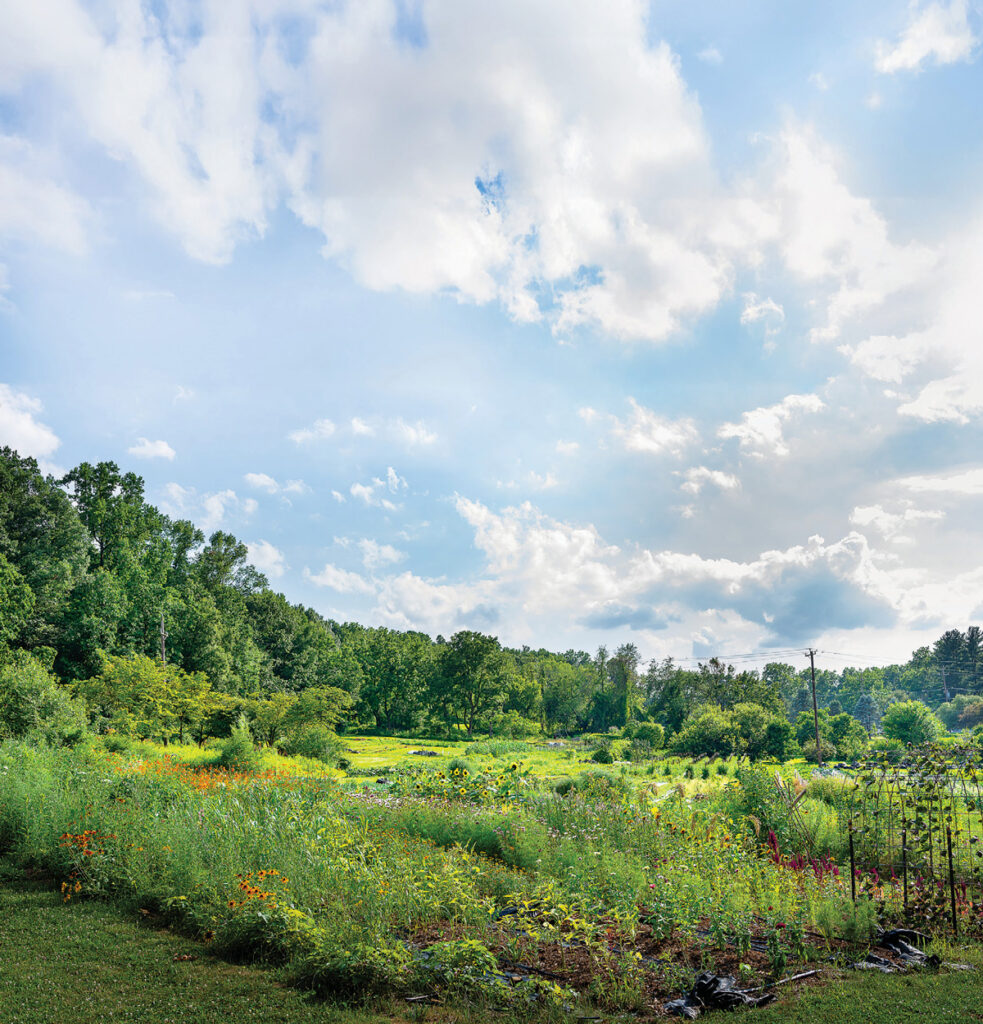
TAPROOT FARM: Value-Added Options
Shoemakersville
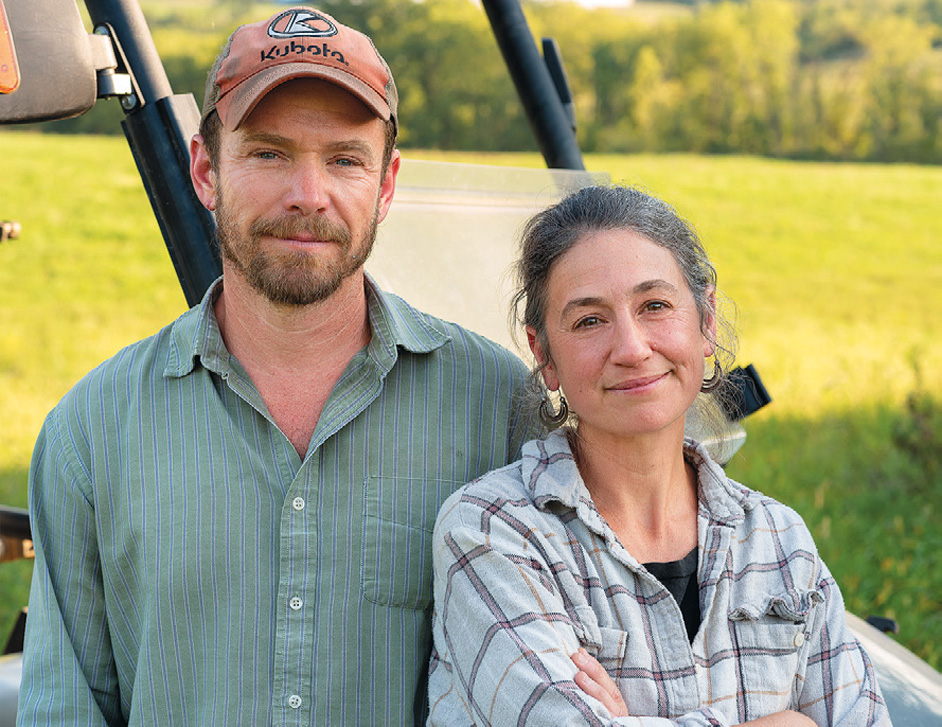
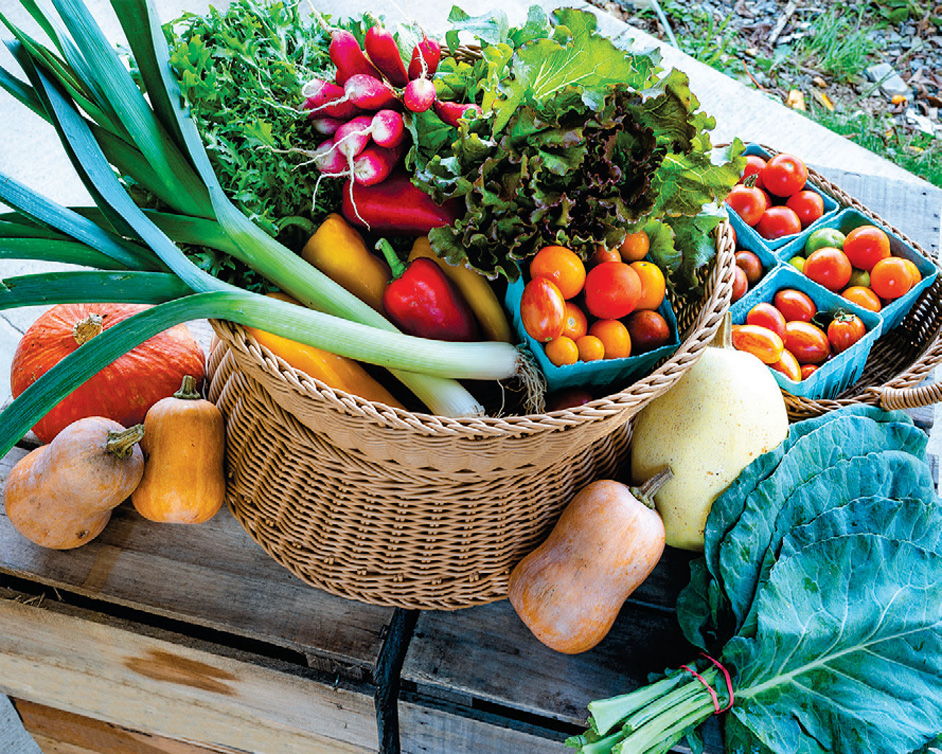 Ola Creston and George Brittenburg started Taproot Farm in 2010, after moving back to the area from Pittsburgh, where they had developed a thorough love for gardening. “My husband and I wanted to start farming when we were starting a family,” Ola explains. “It felt like a good opportunity to work from home and be with our kids.” After moving from Pittsburgh to be closer to family in the Lehigh Valley, Ola and George rented their first plot in Shoemakersville, on five acres of land that was already Certified Organic, to grow food for 27 CSA members during their first year.
Ola Creston and George Brittenburg started Taproot Farm in 2010, after moving back to the area from Pittsburgh, where they had developed a thorough love for gardening. “My husband and I wanted to start farming when we were starting a family,” Ola explains. “It felt like a good opportunity to work from home and be with our kids.” After moving from Pittsburgh to be closer to family in the Lehigh Valley, Ola and George rented their first plot in Shoemakersville, on five acres of land that was already Certified Organic, to grow food for 27 CSA members during their first year.
“From the start, we knew the CSA was the model we wanted to follow,” says Ola. “But it’s still scary when you’re first starting, because people are investing in a product you don’t have ready for them.” From its initial 27 members, Taproot has doubled its number of members every year through the present day, and the size of the farm has kept pace.
Today, Taproot has 50 acres in production and its CSA membership stands at around 550, complemented by a robust presence at the Chestnut Hill Farmers’ Market and wholesale relationships with various partners in the region, which distributes to restaurants and institutions. Ola and George employ a crew of 20 workers at the height of the season, many of whom come back year after year and have become like family.
While George and the crew handle production, Ola focuses on managing the CSA, and says she “dabbles” in farming. “My role as a CSA farmer and manager is to make it really easy to eat local food,” says Ola. “I want our members to fall in love with food, and to know that when they get their weekly pickup, meals can be simple and gourmet, just from cooking with the freshest food they can possibly eat, locally sourced and in season.”
In addition to offering an abundant array of local produce all season long, Taproot also offers share addons by partnering with local cheese producers, apple growers, pasta makers and more. “People can get their whole diet through their CSA with add-ons,” says Ola. “Through the CSA you have a way to access some of the best-produced food in your region and you have it for the full season.”
Taproot’s presence at farmers markets and relationships with wholesalers provide multiple revenue streams apart from the CSA. Ola values her members because of the close connections and cascade of relationships that are created as a result. “Our members know that when they receive their CSA box, they’re fully participating in their community, something they’re a part of,” says Ola. “The fundamental questions people should ask are, ‘Where is your food coming from, who are the people that are harvesting the food, what are their lives like, and what sorts of businesses do you want to support?’”
“Through the CSA you have a way to access some of the best-produced food in your region and you have it for the full season.”
—Ola Creston
HOW TO FIND A CSA NEAR YOU
Beyond the three farms profiled in this story, our area is full of CSAs. If you’re interested in finding one near you, see the list below. Or visit the Buy Fresh Buy Local’s Lehigh Valley CSA guide at buylocalglv.org/csas. Or, stop by your local farmers market and talk with your favorite farmer! There’s a chance they run CSAs and offer pickups at your favorite market.
Blackbird Farms, Bethlehem
Bleiler’s Produce Patch, Breinigsville
Cabbage Throw Farm, Asbury, NJ
Clear Spring Farm, Easton
Crooked Row Farm, Orefield
Dreamland Farmstead, Coopersburg
Gnar Garden, at The Seed Farm, Emmaus
Good Work Farm, Nazareth
Hunter Hill CSA, Easton
Josie Porter Farm, Stroudsburg
My Little Farm Stand, Easton
Pieri Farm & Vineyard, Coopersburg
Salvaterra’s Garden, Alburtis
Taproot Farm, Shoemakersville
Terra Fauna Farm, Northampton
The Good Farm, Germansville
Willow Haven Farm, New Tripoli
